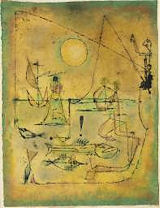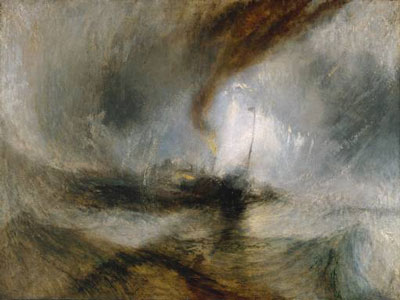




Of course Star Trek is a feast for the engaged eyes and ears, as well as the more contemplative heart, mind and spirit of a viewer.
It is a paltry imagination that can't be aroused by science fiction at its best. To be human is to be curious, about ourselves and our world, about alien beings and their worlds. Fairy Tales are our first taste of the tantalizing wonder of discovering our fate by exploring the unknown, and science fiction exists to enable adults to continue the quest.
— The eyes ...
To think of Star Trek is to bring to mind bright colours and flashing lights, sound, and the perception of hurtling through space (we'll wait for sound until the next section).
The most significant use of colour in Star Trek is its absence during the opening credits, as the tiny spacecraft is propelled like a shooting star through the desolate nothingness of outer space. Tiny points of light reflecting from distant astral bodies only increase the sense of adventure, as well as isolation and danger.
The creators of Star Trek seemed to believe that women throughout the coming centuries would wear their hair increasingly longer and their skirts alarmingly shorter, but, other than that, life inside the ship is shown going on much as it would in our present world, with its sickbay and elevators, personal quarters (with computers), boardrooms and common meeting areas.
But always the flashing lights of instrument panels, the shimmering vanishings and reappearances of the transporter room, together with the constancy of scenes through the viewscreen of the bridge continue to build upon our perception of a starship racing precipitiously through space.
As do dazzlingly bright colours, of uniforms (and unappetizing food), of strange planets and stranger alien creatures.
But colours exist in another less literal sense. It seems to me that the interactions of human personalities affect our minds in the same way as colour combinations are interpreted by our eyes. Which of us hasn't noticed how colours change when they are placed against a different background?
The series creators had the difficult task of choosing the proper psychological colour palette to set off their artistic inspiration. There could be no tampering with the background: the military command structure of The Starship Enterprise. Needed were characters whose facets placed against this backdrop would be burnished to shine like living jewels, each different, each uniquely capable of bringing out the unusual colours in the others, giving them no choice but to attain their brightest potential.
Apart from the military setting, it appears that the other immutable choice was the Vulcan Mr. Spock as the best second-in-command in the entire Starfleet. It seems obvious now that Mr. Spock's intrinsic shades and hues can be shown to advantage only by a Captain who is worthy to be first.
With the exception of the unique brother/sister dynamic of Hansel and Gretel, the protagonist of every Fairy Tale sets out alone to meet his or her fate. One of the signs that we have grown too old for Fairy Tale is that we begin to choose stories that link us with a friend to share our adventures, a friend who is different in character but who understands us in ways that our family cannot. This post-childhood period is perfectly captured in the relationship between the supremely confident Captain James T. Kirk and the exotic but more hesitant Mr. Spock.
As a third member to complete the colour triad of the main cast, the choice of Doctor Leonard McCoy is brilliant but quite perverse when you think of it. Because if the Kirk/Spock duo is post-childhood adolescence, Dr. McCoy's initial reactions to Mr. Spock reach all the way back to infancy and the sandbox. 'This is my friend, not yours. We were playing fine before you came along. You're different, and we don't need you or want you. You like me best, don't you, Jim?'
The answer, of course, is never as reassuring as hoped for. Nor the serene reaction of the antagonist, either. Mr. Spock knows his worth, and is too intelligent and controlled to be trapped into emotional mind games with the baffled chief medical officer.
In lesser hands, the doctor would be the easy villain of the piece. Instead, McCoy is seen to be possessed of great charm, and a sympathetic and genial manner. He is also a good medical officer, whose position as ship's doctor removes him somewhat from the rigidities of rank that hobble the remainder of the crew. The good doctor has one other attribute:— acting as our emissary in his grumpy questioning of the necessity of beaming one's molecules into space to be reconstituted somewhere else, an abnormal practice accepted as normal by the others.
The distinctive personalities of these three men are seen continually casting new and diferent shadings onto the strengths and failings of the others. And the viewer is forced to admit, most reluctantly, that the superior Mr. Spock can be fiendishly annoying when he wishes to be, which is almost always.
The remainder of the crew is chosen with equal sure-handed taste and attention to colour detail.
— The ears ...
To ignore for the moment ears in the literal sense and to concentrate on hearing:
The sounds of Star Trek are many and varied, beginning with the disembodied voice of Captain Kirk lending humanity to the stated Starfleet mission, through the mechanical beeps and boops of the instrument panels, all the way up to the never-to-be forgotten nor mistaken-for-something-else music.
Has there ever been such a magnificent theme, recognizable from the first mysterious opening note?
Each Episode has its own distinctive sound, usually musical, always modern, sometimes no more than a constant heartbeat counting off the moments of terror. —Always modern other than during the syrupy violin sequences accompanying the appearance of an attractive woman on the scene. (Ironically, the 2004 six-part BBC mini-series Blackpool (Viva Blackpool in the United States, Part 7 of these Sandsifter Five Retrospectives), can hardly contain its glee at the prospect of using music written and sung in the United States during the period when Star Trek was created: Elvis and Jimmy Cliff, Smokey Robinson and The Miracles — exciting music relevant to its time and seting, and not a whit out of place in a modern story set in an amusement centre facing the seaside of Northwestern Britain owned and operated by an admirer of all things pertaining to Elvis Presley.)
But of course Star Trek couldn't use something funny, or ironic, as a signature tune warning that an outbreak of lust is about to occur, usually with Captain Kirk as perpetrator and victim. We've forgotten how recent and hardwon is our irreverence about sex, Freud having terrorized an entire generation into worship of what he chose to define as 'normal'.
— The heart:
But lack of irreverence about some subjects is more than made up for by the sixties optimism that permeates every Star Trek Episode. People of the time actually believed in the dawning of a new world order, and Star Trek had more than a little success in convincing its viewers that planetary peace could be achieved with dialogue and good will.
— The mind: Oughties fatalism ...
And yet Star Trek avoided silliness. Even during its First Season, Star Trek had an adult skepticism towards matters military and political. What could be more modern and ironic than an Episode showing Captain Kirk and his Klingon counterpart united in contempt for the sheeplike behaviour of the council leaders on ????[look up] and their refusal even to contemplate the use of force to repel invasion?
Or the acceptance by Kirk and Spock of their seeming responsibilities to defend those who will not defend themselves? Or their expressed opinion that no amount of dialogue or conciliation would ever convince the Klingons to lay down their weapons? That only fear of annihilation would serve?
The genius of Star Trek was to make us accept without hesitation these opposing views and certainties — and many other equally contradictory positions — simultaneously and without irony. We're never surprised when a supposed ally betrays Captain Kirk and the Enterprise crew. We are, however, genuinely regretful that trust couldn't be taken for granted but had to be earned, then, as it must now.
— The soul: Apartness and the eternal mystery of belonging ...
As mentioned earlier, it is my opinion that Star Trek will endure for so long as there remain among us persons unable ever to relax their guard, persons who will never belong, never be part of the group, occasionally by choice but most often by chance. Persons of a different faith, a different colour, a different language and culture. Persons with a grudge. With a secret that can never be revealed. With a severe illness, of body, or of mind.
Things are so easy for those who belong, for the most part undeservedly. They go through life bathed in sunlight as if warmed by their own particular solar sphere. Of course we know that life is unfair. But how can we be blamed if we find it impossible to share the innocent trust in authority of these golden ones, their implicit faith in those institutions that life has taught us cannot be trusted to have our interests at heart?
And is Mr. Spock so effective in conveying the reality of apartness, and exclusion, precisely because he is a Vulcan, bleeding green instead of red, biologically incapable of oneness with our universe? And yet we realize, with shock, that here we have been shown someone who has found, or been given, as second officer of The Enterprise, a place that lends him that fitful elusive precarious sense of belonging among humans, which he maintains only at unimaginable cost, to himself, and to those around him.
Half human, half Vulcan, at home nowhere except the bridge of The Enterprise, Mr. Spock is the true manifestation of the miracle that is Star Trek.
________________________